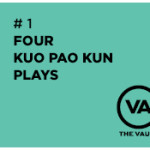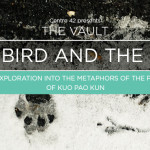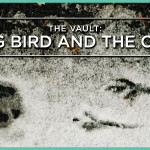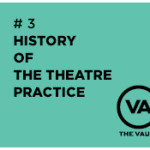Even as a child, Margaret Chan had a dramatic streak. The third child amongst four in a Peranakan family, young Margaret was often called to perform:
“My mother told me that the neighbours used to like to come and see how I play with my dolls. I would give each doll a name and a complex role.”
At home and in school, Chan would invariably be the child called upon to sing. “I didn’t enjoy it. When you are performing for adults you have a fixed repertoire. You have to be cute and polite. You cannot really express yourself,” she says with a laugh.”Chan merry Chan by Steven Lee. In The Straits Times (18 May 1992), http://tinyurl.com/neue7b6
In her twenties, Margaret began acting in a number of amateur theatre productions. In 1977, she played the maidservant Cicada in Li Lien Fung’s The Sword Has Two Edges, produced by the Experimental Theatre Club (founded by pioneering Singapore English-language playwright Lim Chor Pee).
“As Cicada, Margaret Chan has given what I consider her most inspired performance to date. But I do wish she would stand straight on stage.
She has overcome her tendency to overact and was able to lose herself in the role so that I was moved by Cicada’s plight.”Source: Breathes life into history… by Violet Oon. In New Nation (26 August 1977), http://tinyurl.com/qhy7pfe
But her breakthrough role was in 1985 as the titular Nonya matriarch in Stella Kon’s one-woman play Emily of Emerald Hill, directed by Max Le Blond. Even while heavily pregnant with her second child, Margaret’s solo performance as Emily was highly acclaimed:
“By the time Margaret Chan had taken her second curtain call, the tears hadn’t yet dried on some faces though they were wreathed in smiles…
But how Margaret brought Emily to life!
Dr Mark Kon [Stella Kon’s husband], who had seen last year’s staging of Emily of Emerald Hill in Kuala Lumpur, was equally enthusiastic not just about Margaret’s performance but also about her interpretation.
“While Leow Puay Tin who played the part of Emily in the KL production was more the nonya, Margaret plays Emily as the person who comes from the outside and controls the family,” agreed Robert Yeo, chairman of the Ministry of Community Develoment’s drama advisory committee, and the man who had approached both Max [Le Blond] and Margaret to do the play.”Source: Tears and smiles greet Emily by Rebecca Chua. In The Straits Times (6 September 1985)., http://tinyurl.com/qhy7pfe
Margaret’s stage career forged ahead with leading roles in productions such as Beauty World (1988), The Evening Climb (1992), Lao Jiu (1993) and No Parking on Odd Days (1994). In the 1990s, she also starred in television shows such as The Ra Ra Show (1993), Masters of the Seas (1994) and The Golden Pillow (1995), and played Malcolm’s mother in the 1996 feature film Army Daze based on the play by Michael Chiang.
Margaret also led a second life as a working journalist, holding editorial positions in New Nation (now defunct) and Wine & Dine magazine. A large chunk of her journalistic writing was devoted to food criticism – her adventurous palette and knowledge of food made her a natural at reviewing restaurants and food places. In 1992, she published a guide to Singapore restaurants called Foodstops – 1000 Places to Eat and Drink in Singapore.
“It was feeding time at the zoo. Last Saturday night, at the Okoh, it took all of my self-control to keep from sticking my tongue out at the seeming hundreds that gaped through the glass windows as we dined…
We enjoyed the meal though the rice was cold. Didn’t the Japanese invent rice cookers?
Incidentally, an enormous cockroach crawled up the wall next to me – you should have seen me jump.”Okoh’s OK but for gawkers and cold rice by Margaret Chan. In New Nation (19 July 1981), http://tinyurl.com/q7xn5tf
“Margaret is the kind of eating companion we would all love to have. She is game to try anything (remember her account of that strengthening soup made of bill’s penis and recently, of eating monkey flesh and other exotic meat?). Margaret has sought out dishes and delicacies in all kinds of places, from food palaces in Hong Kong to decrepit stalls hidden in back lanes.”Tasters range from cooks to gourmands. In New Nation (26 June 1981)., http://tinyurl.com/ow6c3p3
In 1996, she embarked on postgraduate studies at the University of London, earning a Certificate of Teaching in Higher Education (Distinction) and Master of Arts (Distinction) in performance studies in 1998. She then pursued a doctoral degree in theatre/performance studies and, in her 50s, was awarded a PhD in 2002.
Margaret returned to Singapore and joined the Singapore Management University (SMU) in 2003. She is now an Associate Professor Associate Professor of Theatre/Performance Studies (Practice) at the School of Social Sciences, where she teaches creative thinking, ethnography and postmodern theatre studies. As an academic, she has written, presented and published work on theatre and ritual in Chinese spirit medium worship.
(Source: Singapore Management University)
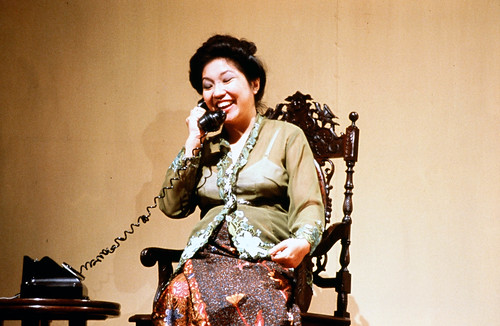
Margaret as Emily in 1985. (Source: youth.sg/National Arts Council)
Selected Theatre Lead Roles
2001 – Blithe Spirit by W!ld Rice (Available in The Repository.)
1994 – No Parking on Odd Days by Practice Theatre Ensemble
1994 – Lao Jiu by TheatreWorks (Available in the TheatreWorks archive.)
1992 – The Evening Climb by Practice Theatre Ensemble (Available in The Repository.)
1988 – Beauty World by TheatreWorks
1985 – Emily of Emerald Hill
1977 – The Sword Has Two Edges by Experimental Theatre Club
1975 – Goa by University of Singapore Drama Society
Selected Academic Publications
2014 – Tangki War Magic: The Virtuality of Spirit Warfare and the Actuality of Peace. Social Analysis, Vo. 58 (1).
2012 – The Spirit-mediums of Singkawang: Performing ‘Peoplehood’. In Chinese Indonesians reassessed: History,religion and belonging. London and New York: Routledge.
2010 – Tan Ah Choon: The Singapore ‘King of Spirit Mediums’ (1928-2010). In South China Research Resource Station Newsletter, 60.
2009 – The Magic of Chinese Theatre: Theatre as a ritual of sacral transmogrification. In Change & Innovation in Chinese Opera. Singapore: The National Museum of Singapore and The Chinese Opera Institute.
2003 – Kuo Pao Kun: The Spirit of the Eagle. In Contemporary Theatre: The Director as Cultural Critic, Vol. 13 (3).
Margaret’s full CV is available here. [Click on “CV”.]
By Daniel Teo
Published on 10 October 2015
The Vault: Big Bird and the Cat revisits Kuo Pao Kun’s plays in Margaret Chan’s exploration into the metaphors of Big Bird and the Cat, on 12 October 2015, 8pm at Centre 42 Black Box. Admission is free. Find out more here.


